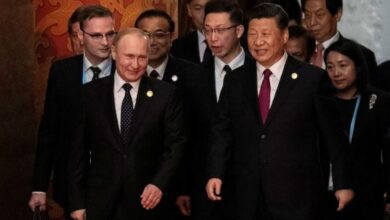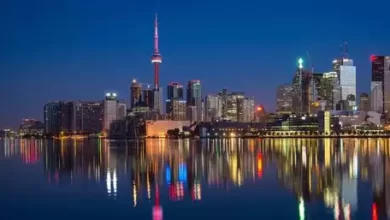I used to be stateless. That’s why I value my Canadian permanent resident card so much
I finally have a piece of paper that documents my existence legally

JN Joniad – for CBC First Person
JN Joniad became a permanent resident of Canada in April. (Submitted by JN Joniad)
This First Person article is the experience of JN Joniad, a former Rohingya refugee who lives in Toronto. For more information about CBC’s First Person stories, please see the FAQ.
When my permanent residency card arrived in the mail, it came with a letter that said, “Thank you for choosing Canada!”
My eyes welled with tears. For the first time in my life, I have a piece of paper that legally documented my existence. For the first time in my life, I felt like I could breathe easily and experience the world’s goodness.
This was such a momentous occasion. Until now, every country where I tried to find a home labelled me as a stateless person or an illegal immigrant.
I was born in a Muslim Rohingya family in the Rakhine state of Myanmar, where my parents had lived for more than 50 years. I had a happy childhood with my big family and loved going to school. But I always knew I was different because other students would bully me. They would call me “kalar,” which meant illegal immigrant in Rakhine.
The Myanmar military government continuously denies that my people are indeed ethnic Rohingya. We are a predominantly Muslim, ethnic minority group in the Buddhist-majority country. Instead, the government says we are Bengali, implying that we are illegal immigrants from the neighbouring country of Bangladesh. Since 1982, the government has denied citizenship to the Rohingya and rendered us stateless. I was given a white card to denote my temporary residency. Although I lived in Myanmar for 19 years, I never like I belonged as I faced daily discrimination and persecution.
JN Joniad at Sittwe beach in Myanmar in 2010. (Submitted by JN Joniad)
In 2012, when anti-Rohingya violence erupted in the Rakhine state, security forces regularly raided Rohingya homes and dragged away anyone they found inside. They specifically targeted the young and educated, whom they viewed as a threat to their authority. Later, some of the abducted bodies were found dead, while others are missing to this day. I lost close friends and relatives. Sometimes, I hid in the forest; I lived in fear of death every day.
At the time, I was studying physics at Sittwe University — a one-day sail from my hometown — when I decided to leave Myanmar. Things were so bad that I didn’t even get the chance to say goodbye to my family. After a terrifying journey on a small paddleboat with several other Rohingya, I reached Bangladesh.
To avoid becoming another refugee languishing in a camp, I moved to India and then China. At each place, I was at risk of being arrested and imprisoned. The nearest safe country seemed to be Australia, which had signed the UN 1951 convention for refugees and asylum seekers. I thought I could rebuild my life there, so I risked my life and was shot at when I crossed the border into Thailand in 2013. From there, I fled to Malaysia and then Indonesia. But I did not make it to Australia; I got arrested while trying to get on a boat and was sent back to Indonesia.
JN Joniad lived as a refugee in Indonesia for almost eight years and protested the treatment of refugees. (Submitted by JN Joniad)
I was locked up in a hotel room for three months and then transferred to a detention centre in south Sulawesi. It was a place of tall walls and electric fences, crowded with more than 500 asylum seekers. One-and-a-half years later, I was transferred again — this time to a community shelter in Makassar, Indonesia.
I met hundreds more refugees from different countries such as Afghanistan and Somalia. The detainees were not allowed to leave the city and have a curfew of 10 p.m. Many days, I woke up terrified by the news of other refugees taking their own lives.
JN Joniad, first in line, took part in several protests raising awareness for the plight of refugees, including one outside the UNHCR office in Makassar, Indonesia, in 2018. (Submitted by JN Joniad)
To keep myself motivated and busy, I joined some online universities to take courses in political science and journalism. I wrote to organizations advocating for refugees, human rights groups, and lawyers to seek answers, but I never heard back. Trying my hand as a journalist, I also wrote articles for Al Jazeera, BBC Indonesia, Buzzfeed and other outlets.
I was threatened by immigration officers with deportation or detention for life if I did not stop writing. I spent years in limbo like this, hoping I could find a home — somewhere I could live freely.
Eventually, my application to come to Canada as a refugee was approved in early 2020. In September 2021, after two weeks of quarantine because of the pandemic, I finally took a long morning walk along Toronto’s lakeshore, breathing in the air of freedom.
JN Joniad, centre, arrived in Canada in September 2021. He stands next to Stephen Watt, who helped organize the five people who sponsored his application for asylum. (Submitted by JN Joniad)
Later that day, my sponsors took me to a bank where I opened my very first account. I wasn’t allowed to do that in Myanmar, so this felt special.
The teller asked me if I had any family in Canada. I smiled and responded that I have five people who sponsored me and now feel like family. Later came my health card and photo ID. Each documentation felt like a validation that I belonged here in Canada.
Finally, in April, I received my permanent resident card. And just as the letter that accompanied the card thanked me, I would like to thank Canada for not only giving me a home but also a legal existence. For me, it’s not just a piece of paper. It means that for the first time in my life, I can study, work, and access health care, and eventually, I will be able to vote when I become a citizen.
JN Joniad at Toronto Centre Island in 2022. (Submitted by JN Joniad)
I know I’m one of the lucky ones, and my happiness is shadowed by the thought of close refugee friends trapped in Indonesia and my beloved family whom I left behind in Myanmar. The situation remains dire for the nearly one million Rohingya refugees who are in limbo just as I was. My fellow refugees have so much to offer to this country. They just need to be given a second chance, a bit of kindness and hope — as I was.




